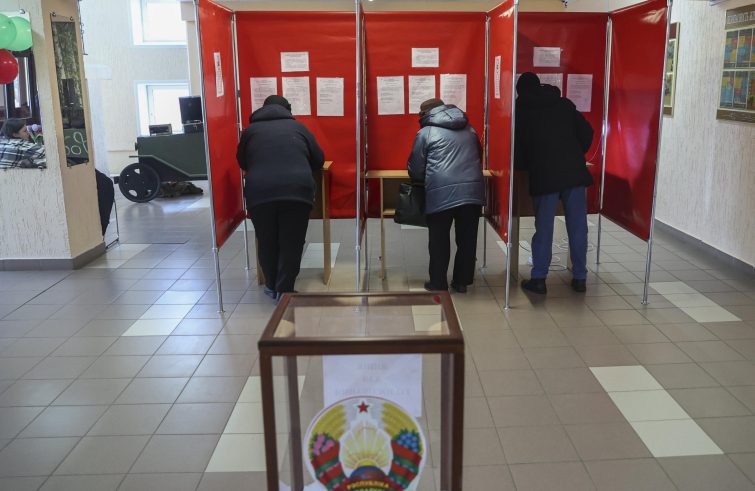
“A staged election, without an opposition party, and with a predictable outcome. Nothing will change, with just the ruling parties.” Serena Giusti, professor of international relations at the Scuola Superiore Sant’Anna in Pisa and fellow at the Italian Institute for International Political Studies (ISPI), comments on the elections to the lower house of the Belarusian parliament that took place on Sunday 25 February. The vote – denounced a few days ago the human rights NGO ‘Viasna’ – took place in the complete absence of any serious political campaign, with civil society organisations having been ‘purged’ from the public arena and with only four pro-government parties authorised. In a statement issued before the vote, the OSCE Office for Democratic Institutions and Human Rights (ODIHR) expressed its deep regret that the Belarusian authorities had decided not to invite external observers to the elections, thus “depriving the country’s citizens and institutions of an impartial, transparent and comprehensive assessment by an international body.” The OSCE assured that it would “continue to follow closely the events in Belarus and their consequences for democracy and human rights.”
Professor, Tass reported that the turnout was an impressive 73.09%. Is this figure realistic? How should we interpret it?
Exiled Belarusian opposition called on voters not to show up at the polling booths, as a form of protest. But even not voting is a very difficult choice for the people living there. The highly centralised Belarusian economy means that the leadership has every means at its disposal to blackmail the population, including depriving people of their jobs through redundancies. This explains why any form of opposition, including abstaining from voting, can be difficult to put into practice. The Republic of Belarus exercises supreme control, not to mention that many times in the past, before elections, pensioners were granted subsidies or pension increases were approved just to achieve consensus. This means that everything is highly distorted.
How can young people accept this situation? What happened to the street protests we wrote about in 2020?
It must be remembered that the members of the opposition parties who were the most determined in those demonstrations are either in prison or have emigrated and are living outside the country.
They manage to have an impact on external actors, and thus on European countries and the United States, but less so domestically, where even social media is under state control. Let us not forget that Russia is a neighbouring country. The events that took place in Ukraine in 2022 weigh heavily. Russia has shown that it can intervene in Ukraine. Obviously, there is a slumbering opposition movement, especially among the youth. But it is very difficult for it to emerge today, for two reasons: firstly, because of internal forms of repression, and secondly, because its leaders are abroad.
The death of Alexei Navalny has sent a very strong message.
It is not just the Navalny case. Just recently another Belarusian dissident died in prison. Once again, these cases show that it takes a tremendous amount of courage.
Is Belarus Russia’s biggest ally, even on a strategic, military level?
As mentioned, Belarus’ economy is heavily dependent on Russia, and Lukashenko’s time in power depends entirely on Vladimir Putin’s favour, although the relationship between the two countries has occasionally been tense. On a personal level, the two leaders are certainly not particularly fond of each other. However, it is worth remembering, for example, that in 2014 Lukashenko did not recognise Russia’s annexation of Crimea. He only recognised it in 2020, under pressure from Putin. Russia, for its part, subsequently provided Belarus with substantial financial assistance to combat domestic unrest. So far, Belarus has managed to stay out of the conflict in Ukraine. As far as we know, there are no Belarusian troops on the front lines, although logistically there are Russian military vehicles stationed on the border, and the Wagner Group was stationed in Belarus for a while.
There is latent resistance, but it would be risky to bring it out in the open, and at the moment there seems to be insufficient strength to do so.
To what extent is Lukashenko’s fate linked to Putin’s?
Simply put, at the moment the only possibility of a regime change depends on Vladimir Putin’s decision to support Lukashenko. Without Russia’s support, Lukashenko would no longer be able to guarantee a decent standard of living for his citizens. Let us not forget, for example, that Belarus relies on imports from Russia to meet most of its energy needs at a very low price. In short, it would lose the legitimacy that some sections of the population, especially the elderly, may still have for the government. Moreover, Belarus has never experienced the kind of transition that Eastern European countries went through in the early 1990s, with all its devastating social and economic costs. Some segments of the Belarusian population may even be reluctant to change because a certain standard of living has been guaranteed up to now, while a glance at neighbouring countries shows that changes often come at a very high price, even in terms of stability. In a nutshell, this economic dependence, which ultimately means regime stability, prevents any changes from taking place and allows Lukashenko to remain in power.
What future developments can we expect in this part of Europe today?
There is certainly a clear dividing line between those countries that have joined the European Union, or at least have very close relations with the European Union, and those countries that continue to be under the influence of Russia and whose future depends on Russia. Just think of what is happening at the moment in the region of Moldova with regard to a possible referendum in Transnistria. As Europe, we can support them. But we certainly cannot interfere in the domestic affairs of these countries.









